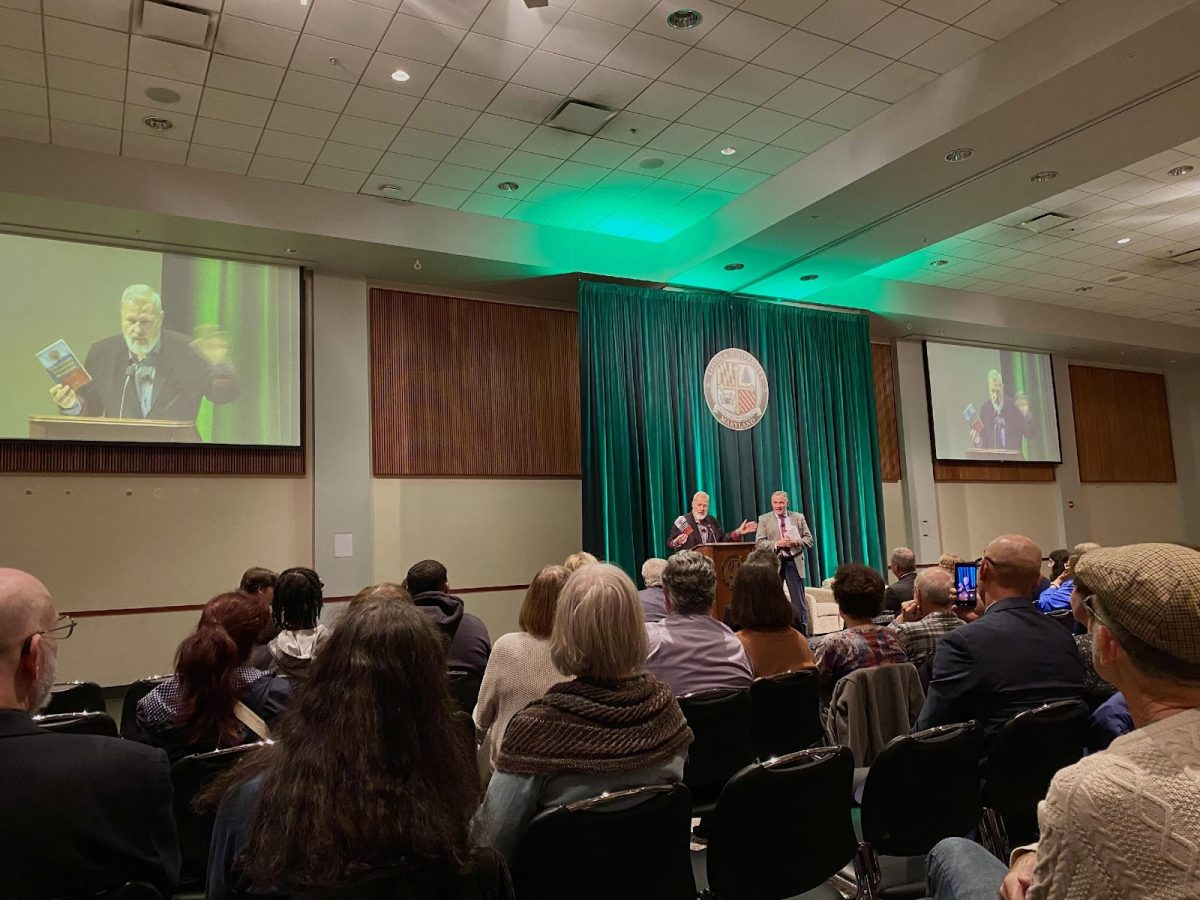At this year’s Hanway Lecture, Dmitry Muratov, a Russian journalist and 2021 Nobel Peace Prize winner told Loyola, “We are on the verge of catastrophe.”
Muratov addressed Loyola students and faculty in McGuire Hall on Oct. 24, sharing his experiences as a journalist in a heavily censored state, highlighting the stark contrast between his work in Russia and that of journalists in America.
The Hanway Lecture is an annual lecture, made possible through the generosity of Eileen and Edward Hanway ‘74, that occurs through the Global Studies program. Every year, the lecture brings noteworthy leaders to the Evergreen Campus. This year’s Hanway Lecture, “Democracy Dies in Darkness,” gave Loyola students the opportunity to hear Muratov discuss the crisis in free press, war threats, and human rights issues. The event attracted over 600 people total, including in-person and virtual attendees who were all eager to hear from Muratov.
Dr. Mary Kate Schneider, Director of Global Studies at Loyola, emphasized the importance of Muratov’s work, exhibiting true reverence for his bravery.
“Journalists are the last line of defense and the first line of resistance,” she said.
When Muratov took the stage, a sense of importance took over McGuire Hall.
“You could feel the energy in the room shift when he got on stage. Everyone was very tuned in to hear what he was saying and know what he went through,” said Katherine Nugent ‘26.
He began his speech by sharing the threat to free press and speech in Russia, as well as what he has endured because of his advocacy for it.
“In Russia, more than 200 independent medias are closed, almost 700 people declared to be foreign agents, and over 20,000 people were punished for participating in anti-war meetings,” he said through his translator.
Muratov himself is among the people declared to be foreign agents. This past September, the Nobel Peace Prize laureate became an addition to the growing list of foreign agents in Russia. He was accused of influencing the public to form a negative attitude towards Russia’s domestic and foreign policies by participating in free press.
His very presence at the Hanway Lecture could be seen as a risk; from 2000 to 2009, six of his colleagues were murdered by the Russian government. Since then, he has seen more of his peers endure torture. Nonetheless, he chose to take the risk and invigorate Loyola Greyhounds to be educated advocates and have a global perspective.
He says his one wish is that journalists would pass “from old age,” not because of their work.
Aside from his passion for free press, Muratov also shared the imminent threat of nuclear attack from Russia with the attendees.
“In America we think the Cold War is over because the USSR does not exist anymore, but from what it sounded like…the possibility of using nuclear weapons is a lot more normalized [in Russia],” Jesser Pilato ‘26 said.
Media in Russia is heavily censored, and news programs are put out by the state to only share a pro-Russia agenda. He shared that the main Russian government television program broadcasts that they should test nuclear weapons in Siberia to scare the West. His intensity permeated the entire audience as he described the state of policy and press.
“Independent journalism inside Russia is completely ruined,” Muratov said.
His tone shifted, however, following his profound speech. The hope he felt for the future was palpable as he looked out at the crowd. Despite having fear of what could come, he has faith in the next generation.
Looking at the current opinions of Russians, he shared that the young generation is the least influenced by propaganda and is spearheading the most dissent with the current administration. They are doing what many in his generation deemed impossible, according to Muratov.
As he gazed into the audience—just seconds after warning the audience of an imminent threat— he exuded a serene optimism, his demeanor a tranquil portrait of contentment. He shared support for the way young people are maneuvering through current-day issues rather than being fixated on mending mistakes of the past.
One lasting question he posed: “Do we want to support the past, or the future?”










































































































